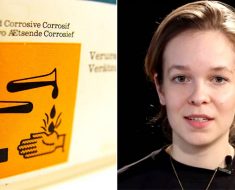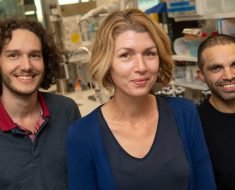Ms. Hustvedt, as a Ghost researcher and writer take part in multidisciplinary case conferences by medical professionals, they teach budding psychiatrists. In your book you write that you ask all of the people, where do you locate the mind or the soul. What do you think: Where is the soul in the body?
So the most you need to locate somewhere from the neck up. I would deep (laughs). For me, the soul is put on top of here. (Hustvedt puts a Hand on your belly below the chest.)
What can pull out Doctors from your new book?
For years I have read and read and thought and then I realized that this question of the relationship between the body and the mind have been treated again and again from many different perspectives, also from the point of view of medicine, but that ultimately we do not know still how everything works together. I work as a volunteer with patients in the inpatient psychiatry. Here we encounter constantly on the Problem: How can we formulate questions in the diagnosis? These categories change as our society. So homosexuality is no longer true today, luckily, as a disease.
In Germany until the seventies. I can imagine how someone would call on Monday morning in the office: “sorry, I’m still gay, I can’t come to work, I’m sick.” And the boss says: “Good improvement.”
As we see how the culture defines what we see as a disease – and this applies not only to mental Suffering. But this kind of paradigm, on which all the disciplines are constructed, are rarely questioned. I have the feeling, and to irritate that it’s my job to throw Sand in the gears to be kind of a pain in the ass! Although I’m not a Doctor, not a psychiatrist, not a neuro-scientist, I have, in the meantime, a good basic knowledge in these disciplines. And usually I know the history of these areas of expertise, and with philosophical questions connected with it, better than most of the experts. The truth lies between the fields. I would like to bring people from different angles think about differently about your own practice. The natural Sciences and medicine are considered to be hard Sciences, to provide certainties, but often that’s not true.
Do you have an example?
Almost every person in the West thinks that testosterone is the aggression hormone. That’s why more men seem to sit in prison, you better be able to think spatially, and so on. This is linear Thinking. I started to read articles about it, and after 200, 300, I came to it: In reality, so far no one was able to prove a link between testosterone and Aggression in humans. It’s not there. This is so crazy! The importance of the hormone for the psychology of the people is not clarified. Western medicine and its model of the human body as a kind of a machine can explain a couple of things really well, the bone structure, the heart. But the nervous system, the endocrine system – these are very different stories. Doubt is not only an expression of intelligence; it is a necessity.
I have brought you, by the way, a scientific Paper. I thought, instead of flowers.
Thank you! I am a passionate reader.
I wanted to impress you. They call themselves a pain in the ass for me, you are his court jester. You declare the Emperor naked. The Emperor, the brain researcher, who always sat on the throne in this case. And now you say: We know nothing.

… “DR. v. hirschhausen’s STAR live a HEALTHY LIFE”. The issue is now on newsstands, or here to buy.
Topics in this issue:
Well, not quite. But the ubiquitous metaphor from the mechanical engineering from the “wired” brain, it seems to me not appropriate. There are apparently specialized regions in the human brain, we know, but they do not work in isolation and are not immutable. The brain is a dynamic Organ in the body of an individual, which is in constant interaction with what lies outside of this body. That means that the brain must also be in relation to what is outside of him and making it work in the first place. Morality, for example, is a date between people, and affects more than one Person and more than just a brain. I just want to make to the explanation of the gap between the brain and the mind is attentive. I’m not trying to plug this hole.
Is there a difference between the body and the spirit?
Most of the people make a difference, in Western culture, we see both the units as separate. You can lose an Arm, and you are still you. But if you have injury to the brain, can change your personality. It is then no longer “you”. You can imagine the mind as an inner voice, an inner narrator. But this voice is not there from the beginning, you developed.
Her book is called “The Illusion of certainty”. What is our greatest Illusion?
The hope that we could reach some kind of immortality. As my mother said We all suffer, we all die. It is a hard truth to accept. We are mortal. We are vulnerable. We need other people to survive.
Many people, especially women, have the idea that you will get sick, for example headache or back pain, because the body is trying to tell you something.
The neuroscientist António Damásio says in his book “In the beginning was the feeling,” the nervous system had come into play, as the feeling appeared in the evolutionary history. This is an important Thesis. Your question aims at. Should we not listen to our body when something is wrong? Yes, of course! I think this is one of the reasons why cancer is such a terrible thing. Because people don’t feel it. Only if it’s very late, sometimes too late. Because this type of error in cell replication, adhere to sends no signals as it does a sick body usually.
But particularly the cancer a lot of people over interpret. There is an esoteric model, as a result, all diseases due to a conflict in the past, would be triggered.
But no, this is ridiculous!
The way I see it, because Thinking only leads to a bad Conscience …
… because they have allegedly done something wrong. I think it’s just awful, because it is not so that you can think of, through good thoughts, healthy.
You know the research by Ted Kaptchuk, the thinkers of the Harvard Medical School?

What is the greatest Illusion of mankind? Siri Hustvedt is certain: “The hope that we could reach some kind of immortality.”
He found out that you can tell the people quiet, that you give them a Placebo, because it works anyway. But I would argue that Placebos have nothing to do with positive Thinking, but part of the doctor – Patient relationship. The doctor prescribes the patient a tablet. And then what happens in the nervous system of the patient, a physical recovery or an unconscious reminder of times when man was a happy toddler, which was supplied by the mother. If one understands the so, we are dealing with a reciprocal relationship of mind, body, and environment.





